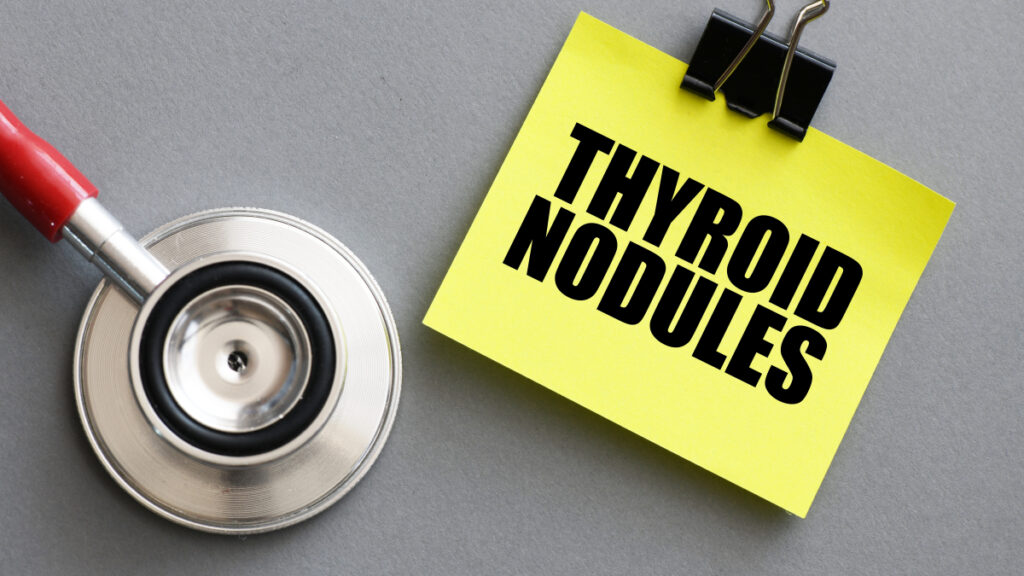
Overview
Nodules that are solid or filled with fluid can form inside your thyroid gland, a tiny gland found at the base of your neck, right above your breastbone. Thyroid nodules are very common, but only a small fraction are cancerous. Thus, most thyroid nodules are harmless and do not result in any symptoms.
Most people may not realize they have a thyroid nodule until their doctor detects it during a general medical examination. Or, it could be discovered by your physician during a scan performed for one of your other health concerns. However, some thyroid nodules can grow so large that they become obvious to the naked eye or make it difficult to swallow or breathe. Your type of thyroid nodule determines the best treatment options available to you.
Key Facts
- Thyroid nodules are very common in Nigeria with more than 1.5 million cases yearly.
- Thyroid nodules are most common among people above 40 years (adults and seniors. So, they are more common as you age.
- The condition is very rare among babies and children (0-13 years) in Nigeria.
- Thyroid nodules are more prevalent in women than in men.
- The vast majority of thyroid nodules, making up over 95% of them, are completely harmless (noncancerous).
- You may not be aware you have thyroid nodules because many of them do not cause any symptoms.
- Genetics may play a role in the condition.
- You may prevent thyroid nodules by avoiding the risk factors.
- It is possible to treat large thyroid nodules, sometimes even without surgery.
Symptoms and Diagnosis
Symptoms
People with thyroid nodules don’t usually experience symptoms.
However, if present, the possible manifestations and signs of the condition include:
- Neck discomfort
- Difficulty swallowing
- Hoarse voice
- Swelling at the base of the neck
- Unexplained weight loss
- Irregular pulse
- Anxiety
- Nervousness
- Tremor
- Intolerance to cold
- Dry skin
- Increased sweating
- Swelling in the face
The size of the nodule might also influence the severity of the symptoms. You’ll find the thyroid gland in front of the throat, close to both the windpipe and the food pipe. If a nodule presses on a person’s windpipe or food pipe, the person may suffer from the following conditions:
- Difficulties in swallowing,
- A tickling sensation in the throat
- Difficulty breathing
In unusual instances, a person may feel pain at the site of the nodule. This pain radiates to the ear or jaw.
Diagnosis
The following procedures are employed in the diagnosis of thyroid nodules:
- Thyroid scan: This procedure involves swallowing radioactive iodine. Your doctor will assess how much radioactive iodine the thyroid nodules and normal thyroid tissue absorb. Then, your doctor will be able to evaluate if the thyroid nodules are cancerous.
- Fine-needle biopsy: In this test, a sample of cells from one or more thyroid nodules is taken with a thin needle. If the test results aren’t clear, your doctor may repeat this test. They may also suggest surgery to remove the nodules to get a clear picture of the problem.
- Thyroid blood test: This test examines the thyroid hormone level in your blood. Your thyroid hormone levels are usually satisfactory, even if you have nodules. Yet, they can be occasionally low, which may be a sign of thyroid disease.
- Ultrasound (thyroid imaging): This imaging procedure takes pictures of your thyroid gland using sound waves. It can establish if a nodule is solid or a cyst filled with fluid. According to the American Cancer Society, people with solid thyroid nodules have a higher risk of developing thyroid cancer.
Ultrasonography aids in locating nodules that are challenging to feel while also monitoring the progress of nodules. Additionally, when performing a fine-needle biopsy, medical professionals occasionally employ ultrasonography to help direct the insertion of the needle.
Causes and Preventions
Causes
Most thyroid nodules occur due to an abnormal proliferation of normal thyroid tissue. In most cases, the reason for this excessive growth is not known. It is assumed that thyroid nodules have a genetic basis as the condition runs in some families.
Thyroid nodules are sometimes linked to the following conditions:
- Hashimoto’s thyroiditis: An autoimmune disease that can lead to hypothyroidism and thyroid cancer.
- Thyroid cancer
- Obesity
- Iodine deficiency
Iodine deficiency is extremely uncommon in many developed countries as a direct result of the widespread consumption of iodized salt and multivitamins that include iodine.
Additionally, smoking increases your risk of thyroid nodules.
Preventions
You can lessen your risk of having them by controlling specific risk factors. For instance, if you are obese, you should discuss how to maintain a healthy weight with your healthcare professional.
Try to stop smoking excessively if you do. Also, make sure your food has an adequate amount of iodine. You’re probably getting enough if you use table salt that has been iodized.
According to some studies, oral contraceptives and statins users may experience a decreased risk of thyroid nodules.
Typical Treatments
The type of thyroid nodule determines the treatment method.
According to the Mayo Clinic, treatment options for thyroid nodules include:
- No treatment; wait and observe: You and your doctor may decide that you don’t need treatment immediately if the nodules aren’t malignant. You may need to visit your healthcare provider frequently so they can monitor any changes to the nodules.
- Iodine-131: Radioactive iodine is used to treat goitres and thyroid nodules. The radioactive iodine is absorbed by your thyroid gland, which causes the nodules to get smaller.
- Surgery: The best course of action for cancerous nodules that cause obstructive symptoms, such as difficulty breathing or swallowing, and are “suspect” (i.e., they cannot be diagnosed without being physically removed and inspected) is to remove them through surgery.
Conclusion
Over 99% of thyroid nodules turn out to be harmless. Even in cases where the thyroid nodules are present, the condition may be treated successfully, and it only rarely threatens the patient’s life. There are several types of thyroid nodules, some of which are more aggressive than others.
Even if a nodule is found free of cancer, it may require treatment, monitoring, or both. People who need surgery to remove it may need to take medications to ensure their bodies receive an adequate supply of thyroid hormones after the procedure.
MOST COMMON






